partnering with community organisations - Department of Families ...
partnering with community organisations - Department of Families ...
partnering with community organisations - Department of Families ...
You also want an ePaper? Increase the reach of your titles
YUMPU automatically turns print PDFs into web optimized ePapers that Google loves.
Section Three: Maintaining a<br />
successful partnership<br />
>> support partnership changes and refinements;<br />
>> support current partnership directions;<br />
>> affirm that your partnership program was implemented<br />
as planned and determine if it had the intended<br />
achievements;<br />
>> address any staff/<strong>community</strong> concern; and<br />
>> help determine if your partnership has come to an end.<br />
It is important to note that there is a difference between<br />
monitoring and evaluating. Monitoring means the process<br />
and tools used to account for, check and record the<br />
course <strong>of</strong> your partnership program and its improvements.<br />
Evaluation means literally to look at, and judge, the<br />
partnership and its program’s quality or value based on<br />
the evidence you have collected through your monitoring.<br />
An evaluation will show you the impacts and outcomes<br />
<strong>of</strong> your partnership.<br />
Use Tool 6: Evaluating the Partnership and its<br />
Program will help you plan and implement your<br />
evaluation.<br />
You might also want to talk to Social Compass or a similar<br />
organisation to help you <strong>with</strong> your evaluation plan and<br />
process, or access more resources (see Further resources<br />
on page 20).<br />
Make your evaluation a key resource for deciding what<br />
the future <strong>of</strong> your partnership will look like. That is, will you<br />
continue <strong>with</strong> your partnership or should it be brought to<br />
an end?<br />
Where evaluation is concerned make sure you:<br />
>> evaluate the partnership arrangement and relationships<br />
on an ongoing basis;<br />
>> consider monitoring and evaluating from the start <strong>of</strong><br />
the process, even though it usually appears as one<br />
<strong>of</strong> the final steps. When developing partnership aims<br />
at the beginning <strong>of</strong> the partnership, there should be<br />
discussion about intended achievements and how<br />
information will be gathered to measure these;<br />
>> revisit the aims and achievements resulting from the<br />
partnership on a yearly basis;<br />
>> solicit wide input into the evaluation process from all<br />
partners and from staff at all levels <strong>of</strong> each organisation;<br />
and<br />
>> make changes based on the findings <strong>of</strong> the evaluation.<br />
However, during evaluation, concerns and disappointments<br />
can be raised and differences <strong>of</strong> opinion may be voiced. It<br />
is important to have an open process <strong>of</strong> evaluation where<br />
all stakeholders in the partnership can contribute.<br />
Evaluations can be difficult to conduct and many<br />
<strong>organisations</strong> commission independent <strong>organisations</strong> to<br />
undertake the evaluation. This is an excellent means for<br />
ensuring independence and objectivity. However, you may<br />
not have the resources to do this and, therefore, may need<br />
to undertake your own evaluation. If you do, work out the<br />
details <strong>with</strong> your partner, talk to other <strong>organisations</strong> that<br />
have evaluated their partnerships and seek advice.<br />
16 ]




![pdf [107kB] - Department of Families, Housing, Community Services](https://img.yumpu.com/51272499/1/190x245/pdf-107kb-department-of-families-housing-community-services.jpg?quality=85)
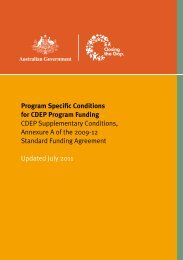



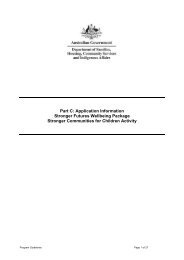

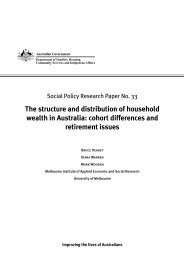
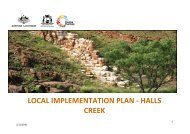

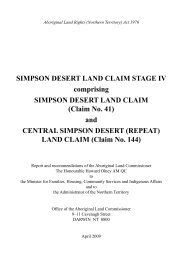
![Land Claim - pdf [278kB] - Department of Families, Housing ...](https://img.yumpu.com/47002639/1/184x260/land-claim-pdf-278kb-department-of-families-housing-.jpg?quality=85)

![Borroloola Land Claim - pdf [299kB] - Department of Families ...](https://img.yumpu.com/46103973/1/184x260/borroloola-land-claim-pdf-299kb-department-of-families-.jpg?quality=85)